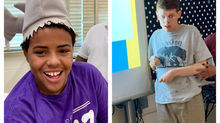Lessons in Understanding: How My Autistic Students Made Me a Better Teacher
- Anne Butler

- Nov 26, 2024
- 3 min read
How It Began
My interest in teaching began in high school. I had worked every summer with kids - autistic kids, kids with intellectual disabilities, all kids…. I loved teaching. I spent each afternoon during my senior year working in elementary schools and learning how to teach by watching experienced educators.
I loved it! I was pretty patient and loved being a leader. I fit the stereotype: I was the oldest of 3 siblings and, as my brothers would say, I liked being the boss. LOL.
Through learning more about special education in college and then in graduate school, I developed the skills to teach and work in various roles as an educator. I was proud of my role in teaching and knew exactly what I was doing.
So I thought.
While I took everything in from my professors, mentor teachers, advisors, team leaders, students’ parents, related service providers, and administrators, there was a group of experts to whom I was not fully listening. A group that I didn't fully give the chance to teach me, to tell me what they needed, what they were thinking, and what their actions actually meant: my autistic students themselves.

The moment that I understood the importance of learning from autistic people, about their experiences, was the moment I shifted from teacher to student. And ironically, becoming a more open learner made me a much stronger teacher.
One February day, a simple instagram post by Reach Every Voice changed everything! I had followed REV for years as Lisa was one of my (FABULOUS) interns at the University of Maryland, where I supervised and co taught seminar courses. The post simply said, “Join Us”.
After talking with Lisa and getting signed up for training, I was thrilled for a new adventure. The Communication for Education course I took opened my eyes to a whole new world of understanding autism.
It was at this time that I was able to understand the true gravity of learning from those experiencing autism. I shadowed Miranda for months and learned countless new things from REV students and my new coworkers!
Embracing the Role of Student
As I embraced my new role as a learner, I found myself growing more humble and open-minded. I began to see each interaction with my students as an opportunity to learn something new. Their unique perspectives and ways of experiencing the world have become invaluable lessons for me as a communication partner and teacher.
I realized that by allowing myself to learn from my students, I was not only becoming a better educator but also a more empathetic and understanding human being.

Challenges and Rewards
Of course, this journey isn’t without its challenges. Communication is complex. There are times when it can be overwhelming, for both student and communication partner.
However, each bump in the road becomes an opportunity for growth. The rewards far outweigh any challenges. The students we work with at Reach Every Voice have been misunderstood and have lacked access to communication for so long. Helping these students find ways to flourish feels so gratifying. What could be more important than supporting another human being to be heard, seen, and understood?

A Continuing Journey
Each day, I continue to approach all interactions with a learner’s mindset. I'm so grateful for the experiences that led me to this realization and for the amazing students who continue to teach me each day.
This journey has not only made me a better communication partner and teacher but has also enriched my life in countless ways. I'm excited to continue growing, learning, and evolving alongside my students, always remembering that the best teachers never stop being students themselves.
For additional training, support, and education around how to incorporate techniques used during sessions in your own home or classroom, please go to Communication for Education. Communication for Education's course addresses core competencies for educators and related professionals who support non-speaking autistic individuals.
The course provides a solid foundation of best practices for developing a partnership between communication partners and autistic individuals by fostering understanding of presumption of competence, apraxia, emotional and physical regulation strategies, and varied communication strategies.

Anne Butler is a Communication Teacher at REV where she provides one-on-one communication instruction for students in our Gaithersburg and Annapolis locations.


























.png)

.png)



.png)


Comments